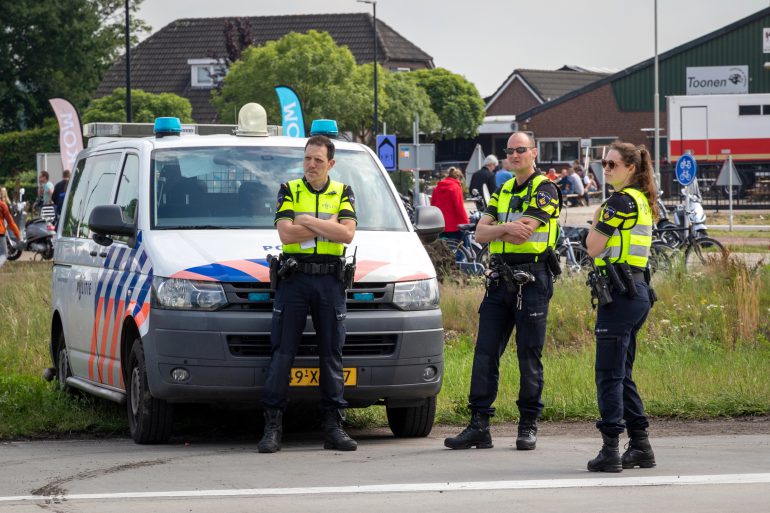A dramatic increase in incidents involving “confused” individuals has placed an unprecedented strain on policeresources, according to Monique Vogelzang, a top official at the Ministry of Justice and Security. “Confused” behaviour is difficult to define, and may range from people walking the streets muttering to themselves, to people threatening others with weapons during a psychotic episode. Last year, police across the Netherlands received approximately 140,000 reports related to confused behaviour, each requiring at least two officers and an average of two hours to handle. This is equivalent to the workload of over four hundred full-time officers, a figure that Vogelzang compares to the entire police force of three medium-sized cities.
Vogelzang expressed her concern during a recent meeting in the House of Representatives, emphasising that thedeployment of police for these cases has reached “far too high” levels.
The Special Interventions Service, typically reserved for counter-terrorism efforts, was called in more than sixtytimes last year to respond to healthcare emergencies and possible suicide attempts – a stark indicator of how strained police resources have become.
A disproportionate burden
Data shared with the House of Representatives reveals that a small group of individuals is responsible for a disproportionate number of these reports. Less than 10,000 people account for more than ten reports each, highlighting the intense focus of police efforts on a limited segment of the population. Within this group, an estimated 1,500 are considered potentially dangerous, with the majority suffering from severe mental disorders, addiction issues or psychosis.
Wouter Dronkers, another Ministry of Justice and Security official, noted that this group presents a unique challenge.‘All kinds of problems come together in this group in a very complex way,’ Dronkers said, underlining the complexity of addressing these individuals’ needs.
A system under strain
The surge in reports is part of a broader trend identified by Michiel van der Wolf, professor of Forensic Psychiatry. Inhis inaugural lecture, ‘In the war of confusion,’ Van der Wolf traced the rapid rise in reports of confused behaviour over the past decade, attributing part of the increase to a growing intolerance for uncertainty and a societal shifttowards more regulation and control.
‘Because we want to control everything, there is more policy, more legislation and regulations, more enforcementand control, and everything becomes more expensive,’ Van der Wolf explained. He suggests that a lack of understanding, rather than increasing confusion, may drive the reported surge.
The human cost
The consequences of this strain on police resources are becoming increasingly severe. According to a recentreport commissioned by the House of Representatives, the number of life-threatening incidents involving confused individuals has escalated, leading to nearly 180 deployments of arrest teams in 2023 and early 2024 alone. Police chief Martin Sitalsing, who oversees the national portfolio for confusedpersons, has raised alarms about the impact on public safety, noting that 75% to 80% of police reports now involve individuals exhibiting confused or problematic behaviour. ‘It is getting out of hand,’ Sitalsing warned in an interview. ‘Regular police work and investigation are suffering greatly.’ He pointed to several tragic incidents, including the stabbing of a 22-year-old woman by a confused man in Amsterdam, as evidence that the problem is reaching a critical point.
Sitalsing also highlighted the broader systemic issues contributing to the crisis. He pointed to long-term cutbacks in mental healthcare, youth services and social care as crucial factors exacerbating the problem. The lack of suitable facilities and support for individuals with complex needs has left many falling through the cracks, with the police often left to pick up the pieces.
Seeking solutions
Efforts to address the crisis have been hampered by fragmentation and a need for coordination among the variousagencies involved. The parliamentary investigation report, Confused and Uncomprehended Behaviour, criticises the proliferation of initiatives and pilots that often operate in isolation, leading to inefficiencies and gaps in care.
One promising initiative is the Rapid Responder Mental Health Care pilot in Friesland, where a social-psychiatric nurse accompanies police to incidents involving confused individuals.This approach allows for more appropriate and immediate care, reducing the burden on police and potentially preventing situations from escalating.
However, Sitalsing argues that more comprehensive solutions are needed. He advocates for increased collaboration between police and healthcare providers and the establishment of 24/7 care facilities for those with complex needs. Without such measures, he warns, society’s safety could be at serious risk. As the debate on addressing this growing crisis continues, the toll on police resources and public safety remains a pressing concern. With theproblem only expected to worsen, finding a sustainable solution has never been more urgent.
Written by Nicole Bea Kerr
